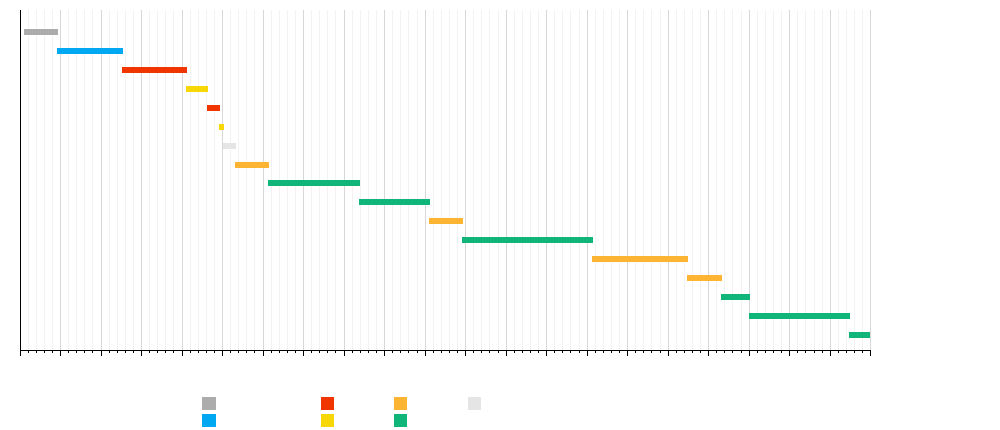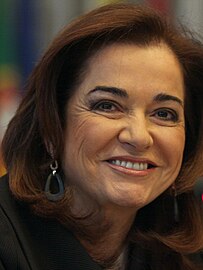Grand Logothete of Lihnidos
This article is incomplete because it is pending further input from participants, or it is a work-in-progress by one author. Please comment on this article's talk page to share your input, comments and questions. Note: To contribute to this article, you may need to seek help from the author(s) of this page. |
| Grand Logothete of Lihnidos | |
|---|---|
 Seal of the Government of Lihnidos | |
| Government of Lihnidos | |
| Style | Grand Logothete The Most Honorable His Excellency |
| Status | Head of the Council of Logothetes |
| Member of | Council of Logothetes |
| Reports to | The Crown Archon Bouleuterion |
| Residence | Palamaras Mansion |
| Seat | Arcadia, Lihnidos |
| Appointer | The Crown |
| Term length | Four years Renewable indefinitely as long as the incumbent has majority support in the Bouleuterion and has the confidence of the Monarch |
| Constituting instrument | Imperial Directive 1197 |
| Formation | 1 January 1920 |
| First holder | Liana, Countess of Meteze |
| Salary | |
| Website | www.gl.gov.lnd |
The grand logothete of Lihnidos (Lihnidosi: Μεγάλος Λογοθέτης της Λιχνίδος) is the head of the Council of Logothetes of Lihnidos. The office of grand logothete was established in 1920 with the creation of the Bouleuterion. The duties and powers of the grand logothete were originally detailed in Imperial Directive 1197 issued by Empress Selene I. Following government reforms in 1946, Emperor Athanasios VIII modified the directive and granted additional powers to the grand logothete. The Lihnidosi order of precedence lists the grand logothete as the third-highest state official after the monarch and archon.
The grand logothete is head of the Council of Logothetes and is responsible for directing the day-to-day operations of government ministries and departments and the civil service. The grand logothete advises the monarch and archon on matters of government and legislative policy. Although officially appointed by the monarch, in practice the grand logothete is the leader of the largest party or coalition in the Bouleuterion and holds office as long as they can command the confidence of the legislature.
Stephanos Anagnos of the Conservative-National Alliance (CNA) has been grand logothete since 13 May 2022. Anagnos was appointed as grand logothete by Empress Stella II after being elected as the leader of the CNA. Former grand logothete and CNA leader Fotis Raptis had previously been defeated in a motion of no confidence among CNA deputies which saw him removed as leader of the party. Raptis subsequently resigned as grand logothete.
History
Selection and incumbency
Qualifications and appointment
In order to be appointed as grand logothete an individual must be a member of the Bouleuterion. This requires any grand logothete appointee to meet the qualifications of being a member of the Bouleuterion. These requirements primarily include being at least twenty-five years of age, being a citizens of Lihnidos for at least five years, and being able to speak fluent Lihnidosi. Political parties are allowed to set additional requirements for individuals running for office as a member of their party. Each party is also allowed to decide the method used to select candidates to run for office. While any member of the legislature could be appointed as grand logothete, in practice the appointee is the leader of the largest party or coalition in the Bouleuterion. Although there is no constitutional requirement that the grand logothete be able to command the confidence of the legislature, by convention it is expected that any grand logothete unable to do so would resign.
The grand logothete is typically appointed following a general election. Following an election, the previous grand logothete is dismissed from office, however they and other members of the Council of Logothetes remain in office as a caretaker until a successor is sworn in. The monarch has the authority to appoint any member of the Bouleuterion to the position of grand logothete. By convention, the monarch will appoint the leader of the largest party or coalition in order to ensure they can command the confidence of the legislature and to show the monarchy's acceptance of the democratic process. In instances where there is no clear majority after an election, the monarch may wait to make the appointment until parties have an opportunity to negotiate coalition agreements.
Once the monarch has appointed a grand logothete, the appointment order is sent to the Bouleuterion and deputies are informed of the monarch's decision by the epistates. The grand logothete will then undergo investiture proceedings held by the Bouleuterion. During these proceedings, the grand logothete presents their political agenda which is then debated by the legislature and voted on. By this time, the grand logothete has normally announced their planned appointments for the Council of Logotetes, and the investiture vote is also seen as a vote of confidence in those appointments. A simple majority is required to confirm the grand logothete, their Council of Logothetes, and their political agenda.
If the grand logothete is unable to win a simple majority in the Bouleuterion following investiture proceedings they are expected to resign. While this is not constitutionally required, a failure to win an investiture vote would signify the grand logothete would be unable to implement their political agenda due to not being able to pass legislation. If the grand logothete refused to resign, it would be up to the monarch to force their resignation. If the monarch allowed the grand logothete to remain in office without the confidence of the legislature, a government crisis would likely ensue. If no appointee is able to command the confidence of the legislature following a general election, the Bouleuterion would normally be dissolved and another election held.
Term length
There is no minimum or maximum length of term for grand logothetes. However, it is normal for grand logothetes to be in office for four year terms which is the usual period of time between general elections. The grand logothete primarily serves at the pleasure of the monarch. As such, it is possible for a grand logothete to have a term shorter than four years if they are forced to resign by the monarch. By convention, the grand logothete also serves only as long as they can command the confidence of the legislature. If a grand logothete becomes unable to command the confidence of the legislature, then they would be expected to resign.
Grand logothetes are dismissed from office following general elections, however if their party or coalition won a majority in the election they may be reappointed. There are no term limits placed on grand logothetes. The same individual can hold the office of grand logothete indefinitely as long as they have the confidence of the monarch and the legislature.
Succession and incapacity
There is no official order of succession for the office of grand logothete. In the event that the grand logothete feels they are unable to carry out the duties of their office for a period of time, such as when undergoing a medical procedure or during an illness, they may temporarily transfer their powers and duties to a member of their council who then becomes acting grand logothete. The grand logothete will then resume their powers and duties when they determine they are again able. If the grand logothete unexpectedly becomes unable to carry out their duties and was not able to designate an an acting grand logothete, or if the monarch decides that the grand logothete is unable, then monarch may designate an acting grand logothete. The ability to appoint an acting grand logothete is rarely used.
Acting grand logothetes are not required to receive approval from the Bouleuterion and can serve for either a specified or unspecified period of time. Acting grand logothetes are not able to dismiss members of the Council of Logothetes or fill vacant positions. They are also not permitted to make changes to the composition of government ministries or departments.
Removal or resignation
The grand logothete can only be removed from office by the monarch. The monarch can remove a grand logothete from office for any reason. The power of the monarch to remove the grand logothete from office is rarely used.
The grand logothete, as the head of the Council of Logothetes, is reliant on the Bouleuterion to pass legislation. If the grand logothete loses the confidence of the Bouleuterion and is unable to pass legislation, they would be unable to effectively govern. While it would not be required for a grand logothete who loses the confidence of the legislature to resign, it is expected that they would do so. If they refused to resign, it would be up to the monarch to decide whether to remove them from office.
Upon the resignation or removal of a grand logothete, the monarch is able to appoint a replacement. Traditionally, the monarch would wait for the majority party or coalition in the Bouleuterion to select a replacement.
Authority, powers, and constraints
Precedence, privileges, and retirement
According to the official orders of precedence in Lihnidos, the grand logothete is the third highest ranking official in the country. The two individuals that are ranked above the grand logothete are the monarch and the archon. In 2010, there was a proposal by the Imperial Offices to position certain members of the Imperial family and select members of the Imperial Household above the archon and grand logothete in the orders of precedence. This proposal, which was submitted to the government, was opposed by the grand logothete at the time. The proposal was ultimately rejected by the government. However, within the Lihnidosi government and society, members of the Imperial family are often considered to unofficially outrank government officials like the grand logothete.
As of 2022, the grand logothete receives a salary of X200,000, including the X75,000 given to members of the Bouleuterion. The salary of the grand logothete is set by the Bouleuterion, and any change in the grand logothete's salary will not take effect until the next legislative term. Aside from the salary of the grand logothete, there are additional privileges granted to the holder of the office. These include an official residence in the capital city of Arcadia, a vacation home in the Samos Islands, and a country home in Messenia. For travel, the grand logothete is granted a number of vehicles, including a variety of cars, helicopters, and jets or airliners. Transportation for the grand logothete is provided by civilian or military operators depending on the method of travel. The grand logothete, their residences, and transportation are protected by members of the Civil Guard.
Grand logothetes are granted lifetime benefits upon resignation or retirement as long as they have served in office for at least one year. These benefits include a monthly pension, medical care for themselves and their spouse, Civil Guard protection, and a funding for office space and a limited staff. These benefits are not available to any grand logothete who was removed from office by the monarch. Former grand logothetes often continue as members of the Bouleuterion or take other positions in government or the private sector.
Recent grand logothetes
Living former grand logothetes
As of November 2024, there are four living former Lihnidosi grand logothetes. Two former grand logothetes, Fania Zarou and Fotis Raptis, are still members of the Bouleuterion.
Fania Zarou
(2002–2006)
13 July 1954Fotis Raptis
(2010–2022)
4 May 1977
Timeline







